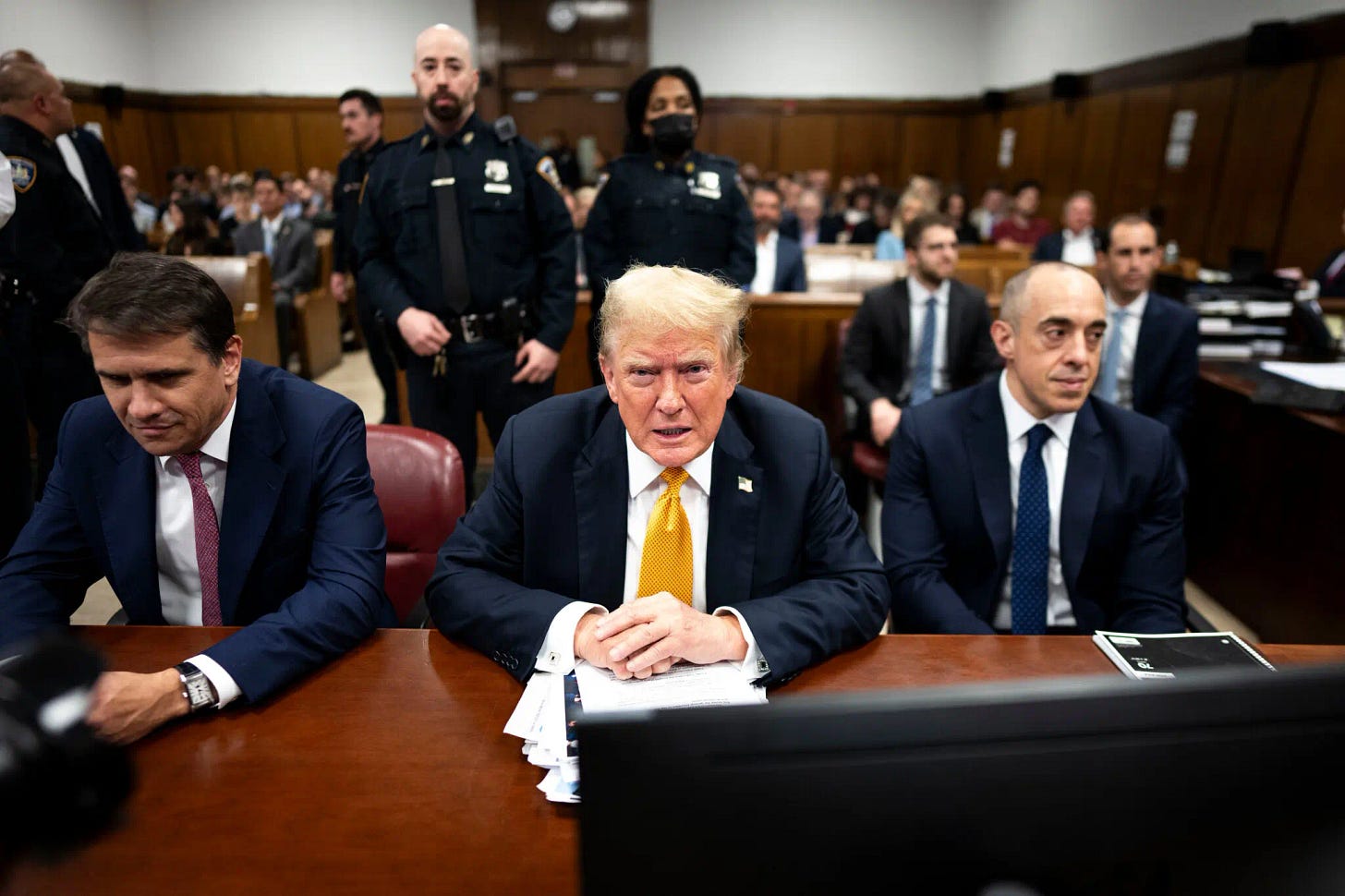Jury Begins Deliberations in Trump’s Hush-Money Trial
The 12-member jury has to return a unanimous verdict; it could be as soon as today.
Jury Begins Deciding Trump’s Fate in Hush-Money Case

Jury Deliberation Begins
Today, 29th May 2024, twelve New Yorkers comprising the jury have begun deliberations on the 34 felony counts against Donald Trump in the first criminal trial of an American president. The jurors filed out of a Manhattan courtroom, tasked with reaching a verdict that could either vindicate Mr. Trump’s argument that he did nothing wrong or mark him as a felon as he seeks to regain the presidency. The 12 jurors began deliberations after hearing six weeks of testimony from a parade of 22 witnesses. They will have to gauge the credibility of a felon convicted of lying, a porn actress, and the former head of the National Enquirer tabloid.
The Charges
Donald Trump is accused of falsifying business records in connection with a $130,000 hush-money payment to porn star Stormy Daniels. The payment, made by his former fixer Michael Cohen, was allegedly reimbursed by Trump, who prosecutors say concealed the nature of the reimbursement. Thus, it is not the payment itself that constitutes the offence, but how it was recorded in the business accounts that is material to this case. If convicted, Trump faces a sentence ranging from probation to four years in prison.
The Prosecution's Case
Assistant District Attorney Joshua Steinglass presented a detailed argument, alleging that Trump orchestrated a scheme to silence Daniels, thereby subverting democracy. He argued that the falsified business records were part of a broader conspiracy to influence the 2016 election. Steinglass emphasised that Trump’s actions were intended to deceive the American voters, framing the hush-money payment as a critical factor that helped Trump win the presidency. “All roads lead to the man who benefited the most, Donald Trump,” Steinglass stated, arguing that the intent was to “hoodwink the American voter.”
The Defence’s Argument
In contrast, Trump’s defence attorney Todd Blanche dismissed the charges as baseless. He portrayed Cohen as an unreliable witness driven by vengeance against his former employer. Blanche argued that Trump’s actions were not criminal but rather standard business practices. He suggested that Trump was too occupied with his duties as president to pay close attention to the business records in question. Blanche urged the jury to deliver a swift and unanimous not-guilty verdict, calling the prosecution’s case a “lie-riddled sham.”
Deliberations and Jury Instructions
Deliberations are unpredictable; it’s common to wait days, or even weeks, for a verdict. Justice Juan M. Merchan provided the jurors with detailed instructions on how to apply the law to the case. The charges against Trump are classified as felonies because they allegedly involved falsifying records to cover up another crime. The jury is expected to deliberate until 4:30 p.m. on Wednesday, with the possibility of extending the discussion if a verdict is not reached.
The Wait for a Verdict
The deliberations are unpredictable; it is common to wait days or even weeks for a verdict. The jury must reach a unanimous decision to either convict or acquit Trump. If they fail to do so, it would result in a hung jury and a mistrial. As noted by Al Jazeera, "All 12 jurors must agree on the decision for the judge to accept it. If the jury cannot unanimously decide a verdict, it would result in a mistrial."
Awaiting the Outcome
As the jury deliberates, the nation, indeed the world, watches closely. The judgement1 could be out as soon as today, but all we can do is wait and see. The outcome hinges on the jury’s interpretation of the evidence and their unanimous decision on the questions of fact, not of law. The jury is also not concerned with what sentence could potentially be awarded if it returns a guilty verdict. Their decision will indubitably impact Trump's future and potentially the 2024 presidential election.
Possible Verdicts
Trump is Found Guilty
For a conviction, all 12 jurors must agree that Trump is guilty beyond a reasonable doubt. If convicted, Trump would be the first major party candidate running for US President as a felon and would almost certainly appeal the verdict. He faces a maximum sentence of four years in prison per count, though experts suggest he is unlikely to serve time due to the non-violent nature of the offence, his age, and his lack of a prior record. Julie Rendelman, a former Brooklyn prosecutor, noted that incarceration is highly unlikely. If imprisoned, the logistical challenges of protecting Trump with court officers and Secret Service staff would be significant.
Trump is Acquitted
If the jury unanimously finds that prosecutors did not prove Trump's guilt beyond a reasonable doubt, he would be acquitted of the felony charges. This outcome would be a major setback for the Manhattan District Attorney’s Office.
A Hung Jury
It only takes one dissenting juror to cause a hung jury, preventing a unanimous verdict. If jurors cannot agree on a verdict, Justice Merchan may instruct them to deliberate further. If they still cannot reach a decision, he would declare a mistrial. Prosecutors would then need to decide whether to retry the case.




